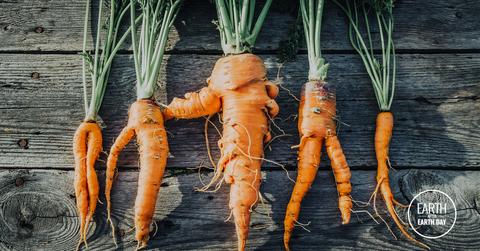Cooking Sustainably: How to Cook More Zero-Waste With Ugly Produce
In the past, “ugly” produce may have gone straight to the landfill — now, it’s probably making its way to your plate!
Updated May 8 2019, 10:01 a.m. ET

Cooking “ugly” might just be the key to cooking sustainably! We’re talking about ugly produce or “imperfect” produce, of course.
In recent years, there’s been a trend of cost-conscious and eco-conscious shoppers showing interest in buying discounted fruits and vegetables that aren’t exactly visually appealing. Imperfect or ugly produce refers to fruits and veggies that aren’t the conventional shape or color. You know, a tomato that’s not a perfect circle or a carrot that kind of resembles conjoined twins. This produce is then sold at a discount — sometimes for 30 percent to 50 percent of the standard price. With 6 million pounds of fresh produce going to waste yearly, simply because it’s not “cute,” selling discounted “ugly” produce is a no-brainer.
Back in 2017, Walmart and Whole Foods joined the ugly produce bandwagon, installing “ugly produce bins” at their stores. But by 2018, both stores (and others that also followed the grocery giants’ lead) dropped the initiative, citing a lack of interest.
“Customers didn’t accept it as much as we had hoped,” said Mona Golub of Price Chopper. Price Chopper too discontinued their ugly produce initiative.
While we’re totally bummed to hear that Price Chopper, Whole Foods, and Walmart have all nipped their ugly produce in the bud, not all hope is lost for shoppers looking to make sustainable, cost-effective options. After all, there’s nothing wrong with a tomato that’s heart-shaped instead of oval-shaped. It tastes just as good!
Hy-Vee is a grocery chain in the Midwest that has kept up its initiative, which is called “Misfits” produce. These Misfits packs include apples, lemons, and oranges that are unconventional sizes or for whatever reason, not as aesthetically-pleasing.
Then there are also delivery subscription services like Imperfect Produce, which delivers to the West Coast, Hungry Harvest, and Misfits Market that will bring the produce to your door weekly or bi-weekly. You can customize your options — based on the food you want and how frequently you’d like a delivery — and you can rest assured knowing that this food is sustainably sourced, certified organic, and non-GMO.